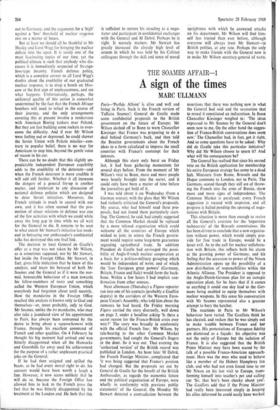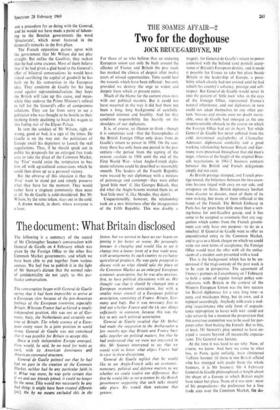A sign of the times
THE SOAMES AFFAIR-1
MARC ULLMANN
Paris—'Perfide Albion' is alive and well and living in Paris. Such is the French version of Taffaire Soames'; General de Gaulle made some confidential proposals to the British government on the future of Europe; Mr Wilson dashed off to Bonn to warn Chancellor Kiesinger that France was preparing to do a deal behind Germany's back, and then told the Benelux governments about the French ideas in a form calculated to impress the small countries with France's contempt for their interests.
Although this story only burst on Friday last, it had been gathering momentum for several days before. From the moment of Mr Wilson's visit to Bonn, more and more people were hourly brought into the secret, and it could only have been a matter of time before the journalists got hold of it.
I was told about it on Wednesday (from a German source), with the gloss that Mr Wilson had violently criticised the General's proposals. My source, who had himself read these pro- posals, had not found them particularly start- ling. The General, he said, had simply suggested that the Common Market should be replaced by a more relaxed organisation which could welcome all the countries of Europe which wished to join; in return the French govern- ment would require some long-term guarantees regarding agricultural trade. In addition President de Gaulle had envisaged the possi- bility of Anglo-French nuclear cooperation as a basis for a politico-military grouping which would be independent of NATO, and of which the 'four European great powers' (Germany, Britain, France and Italy) would form the back- bone. Within a few hours I had implicit con- firmation from other sources.
Next afternoon (Thursday) a Figaro reporter ran into one of his contacts (probably a Gaullist deputy) in the corridors of the Western Euro- pean Union's Assembly, who told him about the rumours he had heard. On Friday morning Figaro carried the story discreetly, well down on page 3, under a headline asking 'Is there a secret reason for the Franco-British crisis over wEu?' The story was broadly in conformity with the official French line : Mr Wilson, by tale-bearing to the other Common Market governments, had caught the General's fingers in the door. So it was out. That evening the 'authorised version' of the British record was published in London. An hour later M Debre, the French Foreign Minister, complained that 'it was being suggested that France's position had changed. But the proposals set out by General de Gaulle for the benefit of the British Ambassador, as regards the economic future and the political organisation of Europe, were wholly in conformity with previous public statements' of the General. On Monday Mr Stewart detected a contradiction between the assertions that there was nothing new in what the General had said and the accusation that to reveal it constituted an indiscretion. In Bonn Chancellor Kiesinger weighed in : 'The ideas expressed to Mr Soames by the General don't seem new to me. On the other hand the sugges- tion of Franco-British conversations does seem new.' The Chancellor had, in fact, got it right. And so some questions have to be asked: Why did de Gaulle take this particular initiative? Why did Mr Wilson choose to spurn it? And what will the consequences be?
The General has realised that since his second veto on the British application for membership his entire European strategy has come to a dead halt. Ministers from Rome, Brussels and the Hague commute to London, not to Paris. The Germans, scared though they still are of throw- ing the French into the arms of Russia, show more and more signs of independence. The Common Market is paralysed; every French suggestion is treated with suspicion, and all progress is halted pending the opening of nego- tiations with Britain.
This situation is more than enough to revive aft The General's aversion for the 'expatriate technocrats' of the Brussels commissions. He has been driven to conclude that a new organisa- tion without power, which would simply pro- vide for free trade in Europe, would be a lesser evil. As to the call for nuclear collabora- tion with Britain, this reflects both his alarm at the growing power of Germany, and his feeling that the accession to power of the Nixon Administration opens up the possibility of a new distribution of responsibilities within the Atlantic Alliance. The President is opposed to the Anglo-Dutch-German plan for an isotopic separation plant, for he fears that if it comes to anything it could one day lead to the Ger- mans being enabled to equip themselves with nuclear weapons. In this sense his conversation with Mr Soames represented also a genuine attempt to bury the hatchet.
The reactions in Paris to Mr Wilson's behaviour have varied. The Gaullists think he has cheated, and reckon that he was simply out to make trouble between France and her partners. His protestations of European fidelity are dismissed as a facade: his objective was not the unity of Europe but the isolation of France. It is also suggested that the British Prime Minister may have been scared by the talk of a possible Franco-American approach- ment. Here was the man who used to behave like a member of the Hubert Humphrey fan club, and who had not even found time to see Mr Nixon on his last visit to Europe, trans- forming himself into teacher's pet and calling out 'Sir, that boy's been cheeky about you'. The Gaullists add that if the Prime Minister had really been interested simply in keeping his allies informed he could easily have worked
out a procedure for so doing with the General; and he would not have made a point of labour- ing to the Benelux governments the word 'directorate', which never featured in the General's remarks in the first place.
The French opposition parties agree with the government that Mr Wilson did not play straight. But unlike the Gaullists, they reckon that he had some excuses. Most of them believe that if he had given a glad hand to the General's offer of bilateral conversations he would have risked sacrificing the capital of goodwill he has built up by his conversion to the European idea. They condemn de Gaulle for his long stand against supranationalisation; they hope the British will take up this cause, and mean- while they endorse the Prime Minister's refusal to fall for the General's offer of compromise solutions. They are far from sorry to see a politician who was thought to be hostile to their thinking firmly declining to hitch his wagon to this fading star of the Elysee Palace.
In sum the conduct of Mr Wilson, right or wrong, good or bad, is a sign of the times. De Gaulle is on the way out, the politicians of Europe await his departure to launch the real negotiations. Thus, if he should speak out in public his proposals for an enlarged free trade area to take the place of the Common Market, the 'Five' would resist the temptation to buy him off with agricultural concessions which he could then dress up as a personal victory.
But the obverse of this situation is that the `Five' want to stand pat and simply preserve what they have for the moment. They would rather have a stagnant community than none at all. So de Gaulle is cold-shouldered. But Mr Wilson, by the same token, stays out in the cold.
A drawn match, in short, where everyone is a loser.



































 Previous page
Previous page